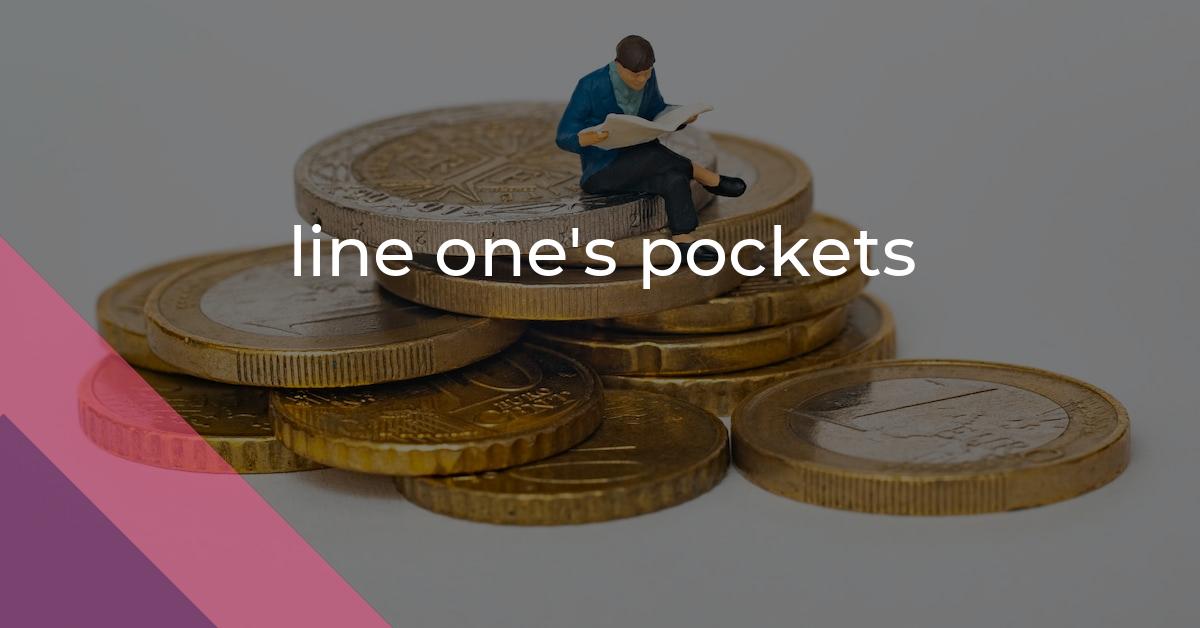line one’s pockets: Idiom Meaning and Origin
What does ‘line one's pockets’ mean?
The idiom line one's pockets means to make money dishonestly or illegally, typically by accepting bribes or engaging in corrupt practices.

Idiom Explorer
The idiom "wet one's beak" means to receive a share of profits or benefits, especially in a dishonest or unethical manner.
The idiom "out of line" means to behave inappropriately or to act in a way that is not acceptable or within the boundaries of what is considered acceptable behavior.
The idiom "on the cuff" means to get something, like goods or services, without paying for it immediately, usually with the intention of paying later.
The idiom "on the breadline" means to be in a state of poverty or financial hardship.
The idiom "on someone's dime" means that someone is paying for something on another person's behalf, usually referring to expenses or costs. It implies that someone else is covering the expenses, taking responsibility for the payment.
The idiom "on one's bill" means to pay for something oneself, without any assistance or help from others.
Unveiling the Enigmatic Riches
The idiom "line one's pockets" is closely related to several other idiomatic expressions that share a similar theme of personal gain through dishonest or illicit means. These idioms include "have one's hand in the till," "quick buck," and "wet one's beak." Each of these phrases sheds light on different aspects of the concept of enriching oneself at the expense of others.
The idiom "have one's hand in the till" refers to the act of embezzling or stealing money, particularly from one's place of work. This phrase suggests a sense of deceit and betrayal, as it implies that someone in a position of trust is secretly helping themselves to funds that do not belong to them. It is similar to "line one's pockets" in that both idioms convey the idea of dishonestly accumulating wealth.
"Quick buck" is another idiomatic phrase related to "line one's pockets." This expression emphasizes the opportunistic aspect of gaining wealth. It suggests a desire to make money quickly and easily, often through shady or unethical means. While "line one's pockets" can encompass a wider range of illicit activities, "quick buck" specifically alludes to the pursuit of immediate financial gain at the expense of integrity or morality.
The idiom "wet one's beak" is also related to "line one's pockets" in the sense that it implies profiting from illegal or unethical activities. This phrase originated from the world of organized crime and refers to receiving a share of illegal profits or kickbacks. "Wet one's beak" specifically conveys the idea of taking a cut or commission from illicit transactions or activities. It aligns with "line one's pockets" in highlighting the practice of gaining personal benefit through underhanded means.
The idiom "line one's pockets" captures the concept of accumulating wealth through dishonest or corrupt practices. It shares similarities with other idiomatic expressions such as "have one's hand in the till," "quick buck," and "wet one's beak," which all underscore the theme of personal gain at the expense of others. These idioms serve as reminders of the moral and ethical implications associated with seeking self-enrichment through illicit means. By understanding the nuanced meanings of these idioms, we can reflect on the consequences of our actions and strive for greater integrity and honesty in our pursuit of success.
Example usage
Examples of how the idiom *line one's pockets* can be used in a sentence:
1. The corrupt politician used his position to line his pockets with money from bribes and kickbacks.
2. The CEO was accused of lining his pockets by taking unauthorized bonuses and inflating his salary.
3. The dishonest contractor took advantage of the project by cutting corners and using cheap materials to line his pockets with extra profits.
More "Finance" idioms



